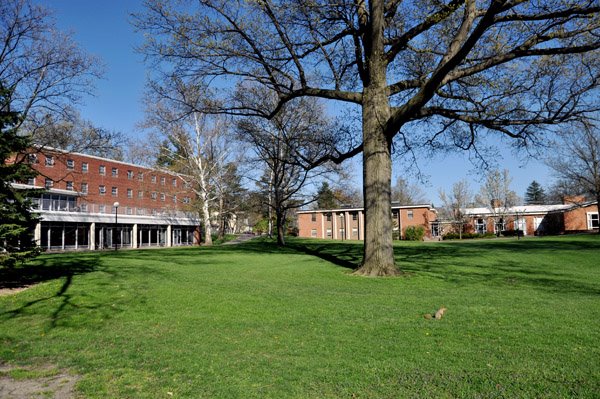Oberlin College students incensed over cultural appropriation, hegemony in cafeteria food


A free daily email with the biggest news stories of the day – and the best features from TheWeek.com
You are now subscribed
Your newsletter sign-up was successful
Complaining about cafeteria food is a decades-old college tradition, dating back to a not-so-distant past when university dining halls served up bland and uninspiring fare three times a day. In this new wave of collegiate activism, some students at Ohio's Oberlin College have updated the critique of cafeteria cuisine to fit the moment, The New York Times has noticed.
A week ago, for example, members of the black student union protested outside the Afrikan Heritage House to criticize the cooking in the Lord/Saunders dining hall inside. Among the complaints: The dining hall should serve fried chicken every Sunday (when it does, it uses "only antibiotic-free chicken"), and not cook with so much cream. "Black American food doesn't have much cream in it," says a petition being passed around by black students, according to The Oberlin Review student newspaper.
In November, Asian students met with Campus Dining Services to discuss complaints about culturally insensitive meals being prepared and served by the food service company hired by Oberlin, Bon Appétit Management Co. Some of the gripes sound reasonable, like serving tandoori beef on the Hindu holiday Diwali (many Hindi don't eat beef for religious reasons; "It's really not okay to do that to a religious dish," freshman Yasmine Ramachandra told The Oberlin Review). Other complaints — like the pulled-pork sandwich on ciabatta bread being passed off as the baguette-enfolding Vietnamese sandwich banh mi, and the General Tso's chicken made with steamed (not fried) chicken and "weird" sauce — were met with rolled eyes.
The Week
Escape your echo chamber. Get the facts behind the news, plus analysis from multiple perspectives.

Sign up for The Week's Free Newsletters
From our morning news briefing to a weekly Good News Newsletter, get the best of The Week delivered directly to your inbox.
From our morning news briefing to a weekly Good News Newsletter, get the best of The Week delivered directly to your inbox.
The charge of cultural appropriation, or one culture poaching the cultural or artistic heritage of another, was leveled most directly by Japanese student Tomoyo Joshi, who was unimpressed with the sushi bar at Dascomb Dining Hall. "When you're cooking a country's dish for other people, including ones who have never tried the original dish before, you're also representing the meaning of the dish as well as its culture," Joshi told The Oberlin Review. "So if people not from that heritage take food, modify it, and serve it as 'authentic,' it is appropriative." Campus Dining Services and Bon Appétit both said they will try to be more sensitive in the future.
"General Tso's chicken aside," The New York Times notes, "students on campus appear to be struggling with deeper racial and cultural rifts."
A free daily email with the biggest news stories of the day – and the best features from TheWeek.com
Peter has worked as a news and culture writer and editor at The Week since the site's launch in 2008. He covers politics, world affairs, religion and cultural currents. His journalism career began as a copy editor at a financial newswire and has included editorial positions at The New York Times Magazine, Facts on File, and Oregon State University.
-
 The Epstein files: glimpses of a deeply disturbing world
The Epstein files: glimpses of a deeply disturbing worldIn the Spotlight Trove of released documents paint a picture of depravity and privilege in which men hold the cards, and women are powerless or peripheral
-
 Jeff Bezos: cutting the legs off The Washington Post
Jeff Bezos: cutting the legs off The Washington PostIn the Spotlight A stalwart of American journalism is a shadow of itself after swingeing cuts by its billionaire owner
-
 5 blacked out cartoons about the Epstein file redactions
5 blacked out cartoons about the Epstein file redactionsCartoons Artists take on hidden identities, a censored presidential seal, and more
-
 ‘One Battle After Another’ wins Critics Choice honors
‘One Battle After Another’ wins Critics Choice honorsSpeed Read Paul Thomas Anderson’s latest film, which stars Leonardo DiCaprio, won best picture at the 31st Critics Choice Awards
-
 A peek inside Europe’s luxury new sleeper bus
A peek inside Europe’s luxury new sleeper busThe Week Recommends Overnight service with stops across Switzerland and the Netherlands promises a comfortable no-fly adventure
-
 Son arrested over killing of Rob and Michele Reiner
Son arrested over killing of Rob and Michele ReinerSpeed Read Nick, the 32-year-old son of Hollywood director Rob Reiner, has been booked for the murder of his parents
-
 Rob Reiner, wife dead in ‘apparent homicide’
Rob Reiner, wife dead in ‘apparent homicide’speed read The Reiners, found in their Los Angeles home, ‘had injuries consistent with being stabbed’
-
 Hungary’s Krasznahorkai wins Nobel for literature
Hungary’s Krasznahorkai wins Nobel for literatureSpeed Read László Krasznahorkai is the author of acclaimed novels like ‘The Melancholy of Resistance’ and ‘Satantango’
-
 Primatologist Jane Goodall dies at 91
Primatologist Jane Goodall dies at 91Speed Read She rose to fame following her groundbreaking field research with chimpanzees
-
 Florida erases rainbow crosswalk at Pulse nightclub
Florida erases rainbow crosswalk at Pulse nightclubSpeed Read The colorful crosswalk was outside the former LGBTQ nightclub where 49 people were killed in a 2016 shooting
-
 Trump says Smithsonian too focused on slavery's ills
Trump says Smithsonian too focused on slavery's illsSpeed Read The president would prefer the museum to highlight 'success,' 'brightness' and 'the future'
